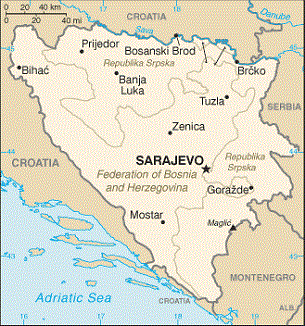
Bosnia:
One of the several countries comprising the Balkan States in Eastern Europe had for centuries been a homeland for ethnic Muslims. The country's population in 1995 was 1mm and the capital Sarajevo had 350,000. Close borders and migration among the surronding Balkan states provided no rigid ancestorial divide among various groups of people. The seperate religious groups included Roman Catholic, Christian Orthodox and Muslim. Brutality at the hands of nonMuslims wreaked havoc on all those inhabitants of the country in an attempt to displace their illusional enemy.
The historical unsettling nature of this region had been multifaceted for the following reasons as 1. Austria and Ottomans held commanding influence, 2. intolerance among factious ethnic groups 3. Russia's compulsion to promote it's common interest in the slavik origin of its people and unite. A fundamental shift was set forth during the Turkish-Ruso war that began from Bulgaria's rebellion against the governing Turkish-Ottamans in 1877. As quickly as the rebellion started, the Russians were drawn in on the side of the Bulgers and war ended a year later in a defeat of the Ottomans who were essentially removed from power. The Russian advancement was diffused though by other Western power intervention and agreements were established at the Conference of Berlin in which Bulgaria was granted independence and Bosnia was to be occupied by Austria.
Romania and Serbia were also liberalized from long standing Ottoman claims. Serbian nationalism grew and frustration at seeing their bretheren subject to occupation by Austria-Hungary fueld strong resentment by that group of Serbian radicals. Sarajevo was suddenly a capital city popularized on the international political map during a visit by the Austrian Archduke Ferdinan and his wife Duchess of Hohenburg. The announced visit had been warned against by the Sarajevo government due to rising hostility. However the plans proceded uninturupted until the evening after the Archduke's speech when the couple was assassinated while being chauffered to visit an injured attache member hurt in an earlier failed bombing attempt. This incident was the tipping point that set off WWI.
In much more recent times times, 2011 witnessed the discovery of the war criminal responsible for the most brazen acts of violence during the four year campaign of 'ethnic cleansing' in Bosnia from 1992-1995. Ratko Mladic, a former Bosnian Serb military commander was brought to trial after elluding captivity for 17 years on charges of commanding that horrific era that resulted in destruction and death of over a 100,000 people. The Dayton Accord negotiated largely from involvement by the United States and NATO instructed for a divisional government consisting of a Muslim-Croat Federation and a Serb Republic be implemented in the mid 90s. Rebuilding efforts proceded dilligently, the remorse though experienced by the victims has not since been totally resolved. Strife appears to still exist among the competing factions of power. The Muslim and Croat federation face uncooperative relations with the archenemy Bosnian Serbs, who despite greivances, are unlikely to take major action because doing so would disrupt the power that they do hold and force an alliance either with the Soviets or Serbia.

